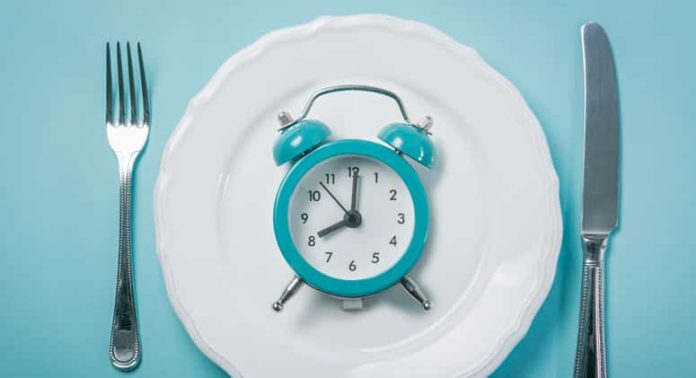
by Joel Fuhrman, M.D., Wellness Contributor
Stuck at a weight plateau? Try adding intermittent fasting to your routine.
The use of time-restricted eating (also called intermittent fasting) is gaining popularity for a variety of health reasons, and if you are stuck at a weight and want to lose some more, intermittent fasting might be the help you need.
Here’s how it works: In the most basic sense, intermittent fasting means to alternate cycles of eating and extended fasting – usually by reducing calorie intake (and/or the window of time you are eating) dramatically a few days per week. Although people fast every day during periods of sleep, the idea of intermittent fasting is to extend the period of time overnight when you are not eating, mostly by eating dinner earlier or skipping dinner for a number of days each week. Studies on humans taking part in intermittent fasting have suggested the practice improves insulin sensitivity and promotes weight loss.3-5
The benefits of intermittent fasting may be achieved in various ways:
- Limiting your caloric intake to a window of 6 to 10 hours a day
- Alternating 5 days of regular meals with 2 calorie-restricted days (of approximately 500 to 600 calories)
- Alternating a longer eating time window one day with a shorter eating time window the next
- Fasting one or two days a week from dinner one night to dinner the next
However, the simplest and most effective way to glean these benefits is to simply eat an early and lighter dinner.
Why it works: Setting a time window for eating may help you stay on track for weight loss. It also tends to help people reduce calories unconsciously.1, 2 Eating less before bedtime makes calorie restriction easier than other weight loss methods such as counting calories, or utilizing special pre-packaged foods.
Going to bed on an empty stomach has numerous other benefits beyond mere weight loss. By restricting your food consumption to a certain window of time, you maximize the interval your body spends in the catabolic phase. Being in this state optimizes your body’s ability to repair and heal itself, reduces growth-related signals by reducing inflammation and slows the aging process. 5-8 There is even a side benefit: Since fewer meals are needed, you reduce the time you would spend on food shopping, prep and clean up.
Of course, just as important as limiting the hours you eat is making good choices about what you eat. A diet full of nutrient-dense, whole plant foods is a superior diet, supplying your body with beneficial phytochemicals and nutrients it needs to prevent illness. A Nutritarian diet keeps oxidative stress, inflammation and DNA damage at bay, while protecting against disease and helping the body to repair and heal.
Earlier is better: Since insulin sensitivity is highest in the morning, 9 evidence suggests that extending a fast during the evening hours is preferable to the morning hours (so skipping breakfast is likely not as beneficial as skipping dinner). 10-12 While it is best to plan your eating window so that you end eating by 5 p.m. or earlier, research suggests that a time-restricted eating window in the afternoon-evening hours is still beneficial compared to a longer eating window.13
If you decide to do intermittent fasting, remember, eat in sync with your circadian rhythms: get most of your calories earlier in the day, preferably before 5 pm. Nothing but water should be consumed during the fasting period. An interlude with such restricted eating may not only increase repair and your health, but also slow aging and extend lifespan.
Thank you to our friends at Wellness.com for contributing this piece.
Copyright 2019, HealthyResearch.com
















